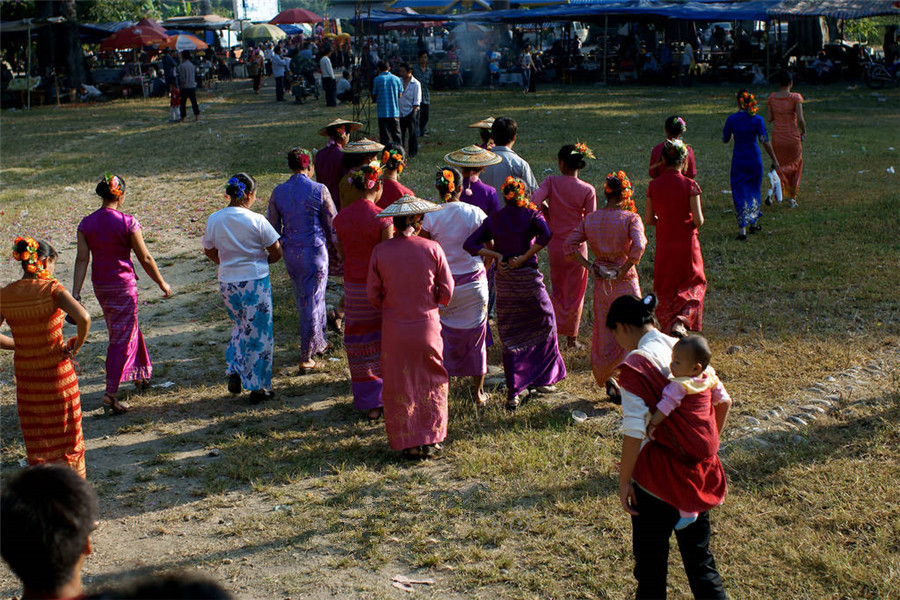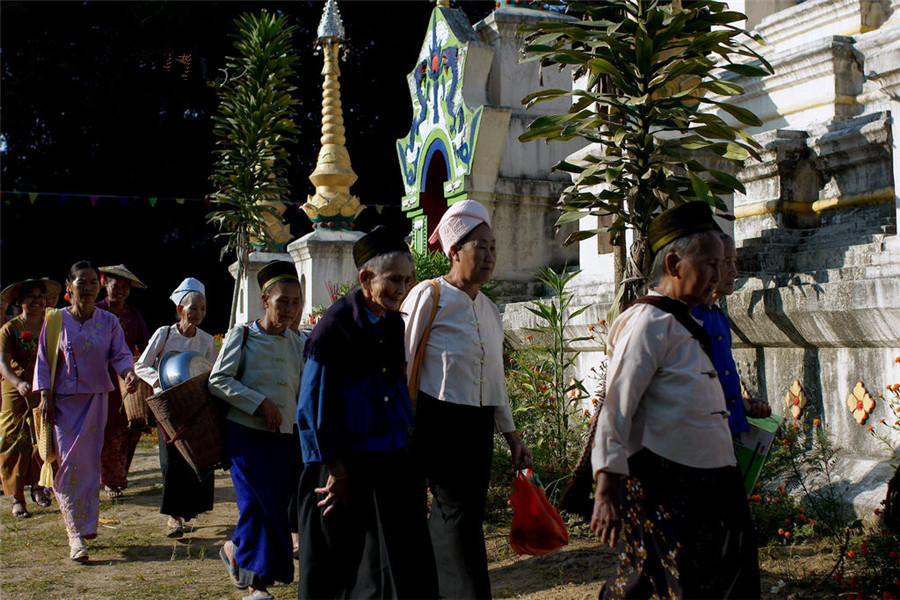
Kaimen (Opening Door ) Festival of Dai Ethnic Minority
Chinese Name:傣族开门节/出夏节/出洼
English Name: Kaimen (Opening Door ) Festival of Dai Ethnic Minority
Open Door Festival, also known as “Out of the Lowlands Festival” or “Lowlands Festival,” is a traditional holiday celebrated by the Dai,布朗族, Deang, and Va ethnic groups in China who believe in Southern Transmission of Upper Buddhism. The festival is held on the 15th day of the 12th month of the Dai calendar (approximately in mid-September). The Open Door Festival symbolizes the end of the three-month rainy season and indicates the lifting of restrictions on marriage between men and women, starting from the closure festival. From this day on, young men and women can start dating or hold weddings. During the festival, young people wear formal clothes to go to the temple to worship the Buddha, offering food, flowers, candles, and coins. After the sacrifice is over, a grand cultural assembly is held to celebrate the end of the three-month fasting period. The main activities include lighting firecrackers and raising lanterns, singing and dancing. Young people also light up various bird, animal, fish, and insect-shaped lanterns and tour the village. At this time, the rice harvest has just ended, so it is also a festival to celebrate the harvest.
The last day of the Lowlands Festival, on the 15th day of the 12th month of the Dai calendar (approximately in mid-October), marks the beginning of the Open Door Festival (also known as “Out of the Lowlands”). This indicates that the three-month fasting period since the closure festival has ended. On this day, both men and women of all ages dress up to go to the temple to worship the Buddha and offer food, flowers, candles, and coins to the Buddha. The elderly often stay in the temple during this time, living a religious life similar to that of the monks. The festival lasts for three days, during which various artistic activities are held. The Buddhist monks are free to come and go, and laypeople can build houses and get married, making the place particularly lively. From a formal point of view, the Open Door Festival and the Lowlands Festival are religious holidays, but in reality they are closely related to production activities. The three-month period of the Lowlands Festival is a busy farming season, allowing people, especially young men and women, to rest and engage in agricultural work. When the Open Door Festival arrives, the harvest has been completed, and people rest and celebrate the harvest, engaging in non-productive construction and social activities. It is necessary to have these activities during the three-day festival period.



Kaimen Festival of Achang Ethnic Minority
阿昌族开门节:
Achang Opening Festival:
It is held on the 15th day of the 12th month of the Tibetan calendar every year, meaning the release of the Buddha from the temple. The festival lasts for three days. At this time, the harvest is over and the agricultural leisure period begins, so the ban on entering the lowlands festival is cancelled, and young people can enjoy themselves freely. On the 15th day, all the unmarried young men in the village carry flower paper and beat elephant-foot drums to parade in the village, while the elderly people go to the Buddhist temple to burn incense and burn the offerings that were placed behind the Buddhist seat in the temple when they entered the lowlands. On the 16th day, the Buddha’s release from the lowlands ceremony is held, and all unmarried girls must enter the Buddhist temple to worship the Buddha. On the 17th day, young men and women from all villages gather to listen to the Buddha’s lectures on scriptures in their own villages. Then, people sing and dance, congratulate each other, and young men and women can start talking and making love again from this day on, forming marriage partnerships.
Kaimen Festival of Deang Ethnic Minority德昂族开门节
The Door Opening Festival of the De’ang Ethnic Group is held on the last day of the annual Door Opening Festival, which falls on the 15th day of the 12th month of the Bengali calendar, and lasts for 3 days. On the 15th day, young men carry flowers and beat elephant-foot drums as they parade around the village, while the elderly go to the Buddhist temple to burn incense and respect the Buddha. On this day, the Festival of Entering the Lowlands is also burned on the east side of the Buddha statue to symbolize the Buddha’s emergence from the lowlands. On the 16th day, a ceremony is held for the Buddha’s emergence from the lowlands, and unmarried young women go to the Buddhist temple to thank the Buddha for the grace of the lifting of the ban. On the 16th day, a celebration and a religious ceremony are held. In the morning, young men and women gather to listen to the Buddha’s scripture and preaching. Then they dance and sing happily, congratulating each other. Since the three-month ban during the Entering the Lowlands Festival has been lifted, young men and women will use the festival activities to court and express their love. As the mid-December of the Bengali calendar marks the end of the agricultural season and the harvest of cotton, the festival not only has religious significance, but also celebrates the harvest.

 7 Days GolfingTour
7 Days GolfingTour
 8 Days Group Tour
8 Days Group Tour
 8 Days Yunnan Tour
8 Days Yunnan Tour
 7 Days Shangri La Hiking
7 Days Shangri La Hiking
 11 Days Yunnan Tour
11 Days Yunnan Tour
 6 Days Yuanyang Terraces
6 Days Yuanyang Terraces
 11 Days Yunnan Tour
11 Days Yunnan Tour
 8 Days South Yunnan
8 Days South Yunnan
 7 Days Tea Tour
7 Days Tea Tour
 8 Days Muslim Tour
8 Days Muslim Tour
 12 Days Self-Driving
12 Days Self-Driving
 4 Days Haba Climbing
4 Days Haba Climbing
 Tiger Leaping Gorge
Tiger Leaping Gorge
 Stone Forest
Stone Forest
 Yunnan-Tibet
Yunnan-Tibet
 Hani Rice Terraces
Hani Rice Terraces
 Kunming
Kunming
 Lijiang
Lijiang
 Shangri-la
Shangri-la
 Dali
Dali
 XishuangBanna
XishuangBanna
 Honghe
Honghe
 Kunming
Kunming
 Lijiang
Lijiang
 Shangri-la
Shangri-la
 Yuanyang Rice Terraces
Yuanyang Rice Terraces
 Nujiang
Nujiang
 XishuangBanna
XishuangBanna
 Spring City Golf
Spring City Golf
 Snow Mountain Golf
Snow Mountain Golf
 Stone Mountain Golf
Stone Mountain Golf











I believe what yoou typed was actually very logical.
But, what about this? suppose you were tto create a
awesome headline? I ain’t suggesting your information isn’t solid., bbut suppose
you added somethig to possibly get folk’s attention? I meawn Kaimen Festivsl of Dai Ethnic Minority – Yunnan Exploration: Yunnan Travel, Yunnan Trip, Yunnan Tours
2020/2021 is kind plain. You ought tto glanjce at Yahoo’s home
page and seee hhow they create post titles to gget peopple interested.
You might try addig a videro orr a related pic oor two to get readers excited about everything’ve got to say.
Jusst my opinion, iit might make your blog a
little bit more interesting.